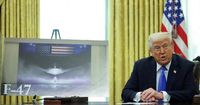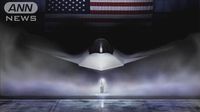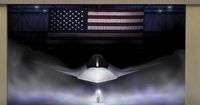On March 21, 2025, U.S. President Donald Trump made a significant announcement regarding the future of the U.S. Air Force's next-generation fighter aircraft. At a press briefing in the White House, Trump declared that the renowned aircraft manufacturer Boeing would be commissioned to develop the next-generation fighter jet, aptly named the "F47," following his designation as the 47th president of the United States. The announcement has generated considerable interest among military experts and the defense industry, marking a pivotal moment in U.S. military aviation.
According to reports, Trump remarked, "A large number of orders were placed but I cannot disclose the amount of the contract," ensuring the secrecy surrounding the financial details of the agreement. The name "F47" pays homage to Trump's presidential number, reflecting the strategic aspirations of his administration to build upon the legacy of previous military advancements.
Following the announcement, Boeing's stock experienced a 4% surge as investors reacted favorably to the news, while Lockheed Martin's shares fell approximately 7%. This financial fluctuation underscores the competitive nature of military contracts, particularly as aerospace giants vie for dominance in defense procurement.
While the design specifics of the F47 remain classified, it is widely anticipated to incorporate advanced stealth capabilities, high-performance sensors, and a state-of-the-art engine. Air Force Chief of Staff General Albin noted that the F47 would be more cost-effective compared to existing fighters like the F22 Raptor, asserting that it would also be more adaptable to potential future threats. "The United States will continue to hold air supremacy in the future with this next-generation aircraft," emphasized the Secretary of Defense, highlighting the strategic imperative behind its development.
Trump also expressed confidence in the capabilities of the F47, stating emphatically that the next-generation aircraft would have the "world's highest capabilities and will ensure that the United States continues to control the skies." This sentiment reflects a broader commitment to military superiority in an evolving global landscape, as adversaries like China enhance their own military technology.
In a pointed commentary, Trump indicated that there may be a future market for the F47 among allied countries. However, he added a caveat: "When we sell to allied countries, the functionality might be reduced by about 10% since they may not be allies forever." This statement has raised eyebrows, as it underscores the precarious nature of international relations and defense sales.
Critics of Trump’s fighter jet plans, including prominent entrepreneur Elon Musk, have voiced concerns about investing heavily in manned aircraft, labeling such developments as "outdated." Musk's critical perspective presents a counter-narrative to the administration's push for advanced conventional warfare capabilities, prompting discussions about the future role of unmanned systems versus traditional piloted aircraft.
The F47 is envisioned as a sixth-generation fighter that will succeed the fifth-generation F22 Raptor, which has long dominated U.S. aerial combat. Enhanced speed and capacity are among the anticipated improvements associated with the new model, and it is projected to be operational by the 2030s.
The strategic implications of the F47 extend beyond mere technological advancements; they are deeply intertwined with the ongoing military dynamics between the U.S. and nations such as China, which is reportedly developing its own stealth fighter, the J-36. As global military threats evolve, the development of the F47 could play a crucial role in maintaining U.S. air superiority in the coming decades.
In summary, President Trump's announcement of Boeing's contract to assemble the F47 next-generation fighter jet sets a new chapter in U.S. military aviation. With its potential to redefine air combat and influence international defense relationships, the F47 represents a bold step forward in fulfilling Trump's vision for military excellence and national security. As such, it may prove critical not only for the U.S. Air Force but also for the broader goals of American defense strategy in an increasingly competitive world.




